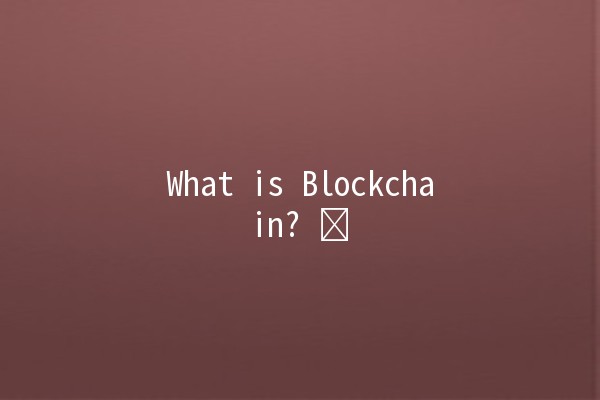




Blockchain technology has emerged as one of the most revolutionary innovations of the 21st century, offering a new way to store and transfer information securely and transparently. Initially popularized by cryptocurrencies, blockchain has found applications across a wide array of industries, from finance and supply chain to healthcare and gaming. This article explores the fundamentals of blockchain, its intrinsic value, the various applications, and five practical tips for leveraging blockchain technology to enhance productivity.
At its core, blockchain is a decentralized digital ledger that records transactions across a network of computers. Unlike traditional databases that are controlled by a central authority, blockchain operates on a peertopeer network where each participant maintains a copy of the entire ledger. This decentralized structure provides several key benefits:
Every transaction recorded on a blockchain is visible to all participants in the network, ensuring that everyone has access to the same information. This transparency reduces the potential for fraud and increases accountability.
Blockchain employs cryptographic techniques to secure data, making it nearly impossible for unauthorized users to alter information without detection. Each block in the chain is linked to the previous block using a cryptographic hash, creating a secure chain of records that can be verified by all participants.

The lack of a central authority means that no single entity has control over the entire blockchain. This decentralization enhances resilience against attacks and failures, as the network continues to operate as long as a set number of nodes are active.
Once a transaction is recorded on the blockchain, it cannot be altered or deleted. This ensures that historical records are preserved intact and can be audited if necessary.
Blockchain can streamline processes by eliminating the need for intermediaries, reducing transaction times and costs. Smart contracts—selfexecuting contracts with the agreement directly written into code—can automatically enforce terms of an agreement, further improving efficiency.
Blockchain technology can be accessed from anywhere in the world, providing opportunities for global commerce and collaboration without the barriers of traditional banking systems.
Incorporating blockchain technology into business practices can significantly enhance productivity. Here are five tips to effectively leverage blockchain for improved operational efficiency and collaboration:
Smart contracts are automated digital agreements that execute when predefined conditions are met. By implementing smart contracts, businesses can reduce the need for intermediaries and enhance transaction efficiency.
Example: A company can set up a smart contract for vendor payments. Once the goods are delivered and verified by both parties, the smart contract will automatically release payments, eliminating manual approval processes and reducing delays.
Blockchain provides unparalleled transparency in supply chains, allowing businesses to track the provenance of goods from source to consumer.
Example: A food company can use blockchain to trace the journey of its products from farm to shelf. Each step in the supply chain can be recorded on the blockchain, enabling stakeholders to verify the authenticity and safety of products, ultimately increasing consumer trust.
Businesses can transition to decentralized data storage solutions to fortify data against breaches and unauthorized access.
Example: A healthcare organization can store patient records on a private blockchain. This system ensures that only authorized medical staff can access patient data while maintaining a secure and immutable record of all interactions.
Accepting cryptocurrency payments can reduce transaction fees and expedite payment processing, especially for international transactions.
Example: An ecommerce platform can offer customers the option to pay with Bitcoin. By doing so, they can reduce dependence on traditional payment processors and facilitate quicker transactions.
Decentralized applications (dApps) operate on a blockchain and offer innovative solutions for various industries.
Example: A collaborative platform for freelance work could utilize dApps to connect freelancers with clients. By using a blockchain for contracts and payments, the platform can ensure fair and transparent transactions, protecting both parties.
Blockchain uses cryptographic algorithms to secure data blocks in such a way that even if a hacker accesses the network, altering any data would require the consensus of the majority of the network. Each block is linked to the previous one through a unique hash, making the data immutable once it’s added to the blockchain. This makes blockchain one of the most secure methods for storing data available today.
Absolutely! While blockchain was first developed as a foundational technology for Bitcoin, its applications extend far beyond cryptocurrencies. Sectors like supply chain management, healthcare, finance, real estate, and even voting systems are exploring blockchain to improve efficiency, transparency, and trust.
Public blockchains, like Bitcoin and Ethereum, are open to anyone to join and participate in the network. They are decentralized and transparent. In contrast, private blockchains are restricted to a certain group or organization. They provide greater control over who can access the network and are often faster and more efficient than public blockchains because fewer nodes are involved in the consensus process.
Individuals and businesses can profit from blockchain in several ways, including investing in cryptocurrencies, creating and selling blockchainbased products, offering consulting services for blockchain implementation, or using blockchain to streamline operations and reduce costs, leading to increased profitability.
Despite its potential, blockchain faces several challenges, including scalability issues, regulatory uncertainty, and the environmental impact of cryptocurrency mining. Addressing these challenges will be critical for broader adoption and longterm sustainability in various sectors.
To get started with blockchain, various online courses, tutorials, and resources are available. Websites like Coursera, edX, and Udemy offer foundational courses. Engaging with communities on platforms like Reddit or participating in local blockchain meetups can also provide valuable insights and networking opportunities.
Blockchain technology offers a myriad of possibilities that extend well beyond digital currencies. By harnessing the intrinsic benefits of blockchain, businesses can achieve greater transparency, security, and efficiency, fostering an environment ripe for innovation. As blockchain continues to evolve, adopting this technology can position organizations at the forefront of their industries, ready to capitalize on new opportunities in the digital age. Whether through smart contracts, enhanced supply chain management, or decentralized applications, understanding and applying blockchain can significantly improve productivity and drive business success.